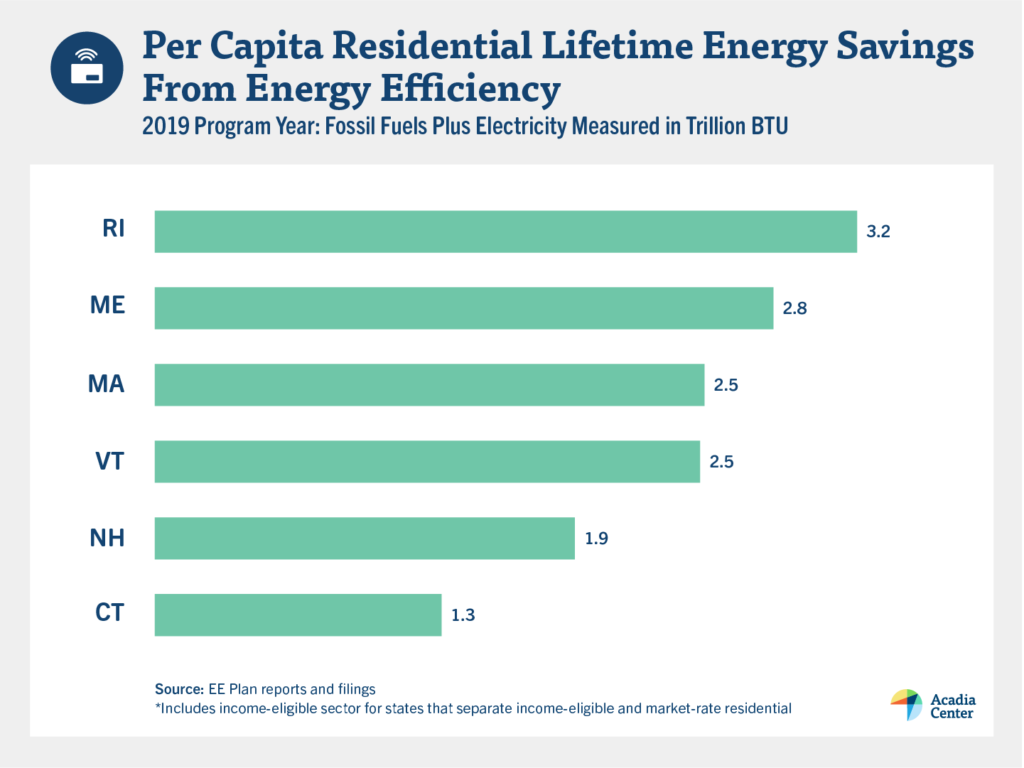Next Generation Energy Efficiency – New PUC Order Represents a Bygone Generation Addicted to Fossil Fuels and Useless Against Climate Change
 A new order by New Hampshire’s utility regulator stops the state dead in its energy efficiency tracks and shackles it to its outdated previous plan. After a year of delay and opposition by some legislators and business groups, the NH Public Utilities Commission rejected a new energy efficiency plan developed as a consensus by utilities, government entities, consumer groups, and Acadia Center and its partners. Order No. 26,553 in DE 20-092 Electric and Gas Utilities: 2021-2023 Triennial Energy Efficiency Plan, released 11/12/2021.
A new order by New Hampshire’s utility regulator stops the state dead in its energy efficiency tracks and shackles it to its outdated previous plan. After a year of delay and opposition by some legislators and business groups, the NH Public Utilities Commission rejected a new energy efficiency plan developed as a consensus by utilities, government entities, consumer groups, and Acadia Center and its partners. Order No. 26,553 in DE 20-092 Electric and Gas Utilities: 2021-2023 Triennial Energy Efficiency Plan, released 11/12/2021.
New Hampshire has some of the oldest and leakiest housing stock in the nation and a high dependency on fossil fuels for heating. Building heating is also one of the largest sources of greenhouse gas emissions in New Hampshire. The new plan was an opportunity to save millions of additional dollars by helping residents and businesses more aggressively reduce energy costs and pollution. The proposed consumer-friendly energy efficiency would have reduced energy costs, increased energy efficiency, decreased greenhouse gas emissions, and provided economic development opportunities. Other Northeast states are making tremendous progress in their energy efficiency programs by maximizing the use of weatherization and beneficial electrification, reducing economic insecurity from the inefficient use of fossil fuels, and creating new jobs and businesses to deliver affordable energy efficiency products and services. New Hampshire can and should do so, as well. Instead, it will remain dead last in New England on energy efficiency policy and programs.
A robust, escalating energy efficiency resource standard would have sent a clear signal to the market in residential, commercial, and industrial programs and a level of certainty that encourages more investment in cost-effective energy efficiency. Instead, the NH PUC has undercut the progress the state had made in saving consumers’ energy and growing good, green jobs in the industry by denying such certainty.
Energy efficiency represents the largest block of energy workers in New Hampshire. The 10,838 Energy Efficiency jobs in New Hampshire represent 0.5 percent of all U.S. energy efficiency jobs. The median wage for all energy workers in New Hampshire is $26.13, which is 37 percent above the national median wage of $19.14. [1] All NH counties have energy efficiency workers in more than 2000 energy-efficiency-related businesses. The future of energy efficiency in NH was looking promising, with ~ 6800 new EE construction jobs needed just to retrofit NH homes by 2030. [2] The expanded efficiency programs could have created 17,500 job-years and produced $3.5 billion in increased economic output in New Hampshire.
Given the international impetus on global climate change and renewed federal action on clean energy and efficiency investments, this was no time to move backwards on robust energy efficiency programs and projects in New Hampshire. New Hampshire deserves to reap the benefits that a more robust NHSaves program can provide. Past progress shows that investments in efficiency grow the economy, create jobs, enhance public health, improve housing, and increase access to low-carbon heating.
But the Commission’s order sends a signal to the market that additional investment in cost-effective energy efficiency is unwanted. Counter to the PUC’s findings, far more must be done to improve the efficiency of NH homes and businesses and to ensure that all overburdened and underserved communities reap the full benefits of efficiency offerings. Many consumers face unequal access to benefits under existing efficiency programs, and underserved communities that face the worst impacts of climate change and poor housing quality have not been able to take full advantage of efficiency programs. Clean electric heating and whole house electrification must be priorities to support the acceleration of clean energy resources and the transition away from fossil fuels.
Acadia Center’s Next Generation Energy Efficiency initiative seeks to tackle these challenges through a new approach – one that focuses on energy savings as a core consumer and energy system resource, but is also centered around meeting climate, environmental justice, and electrification goals. It is an approach that recognizes the interrelatedness of these efforts, which can work in concert to bring Northeast communities the future of energy efficiency. We hope New Hampshire will eventually rejoin other New England states in moving forward to all cost-effective energy efficiency to the benefit of all citizens.
[1] U.S. Department of Energy, U.S. Energy & Employment Jobs Report, 2021, Energy Employment by State 2021.
[2] E4TheFuture, Energy Efficiency Jobs in America, October 2021.




















Follow us